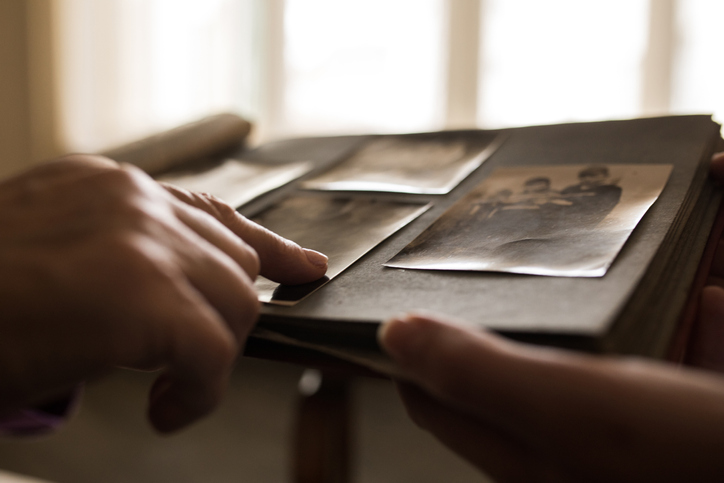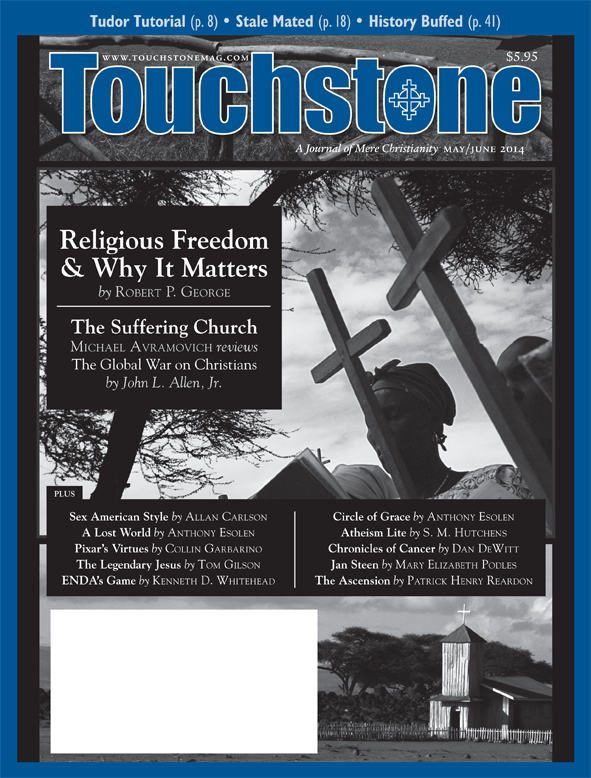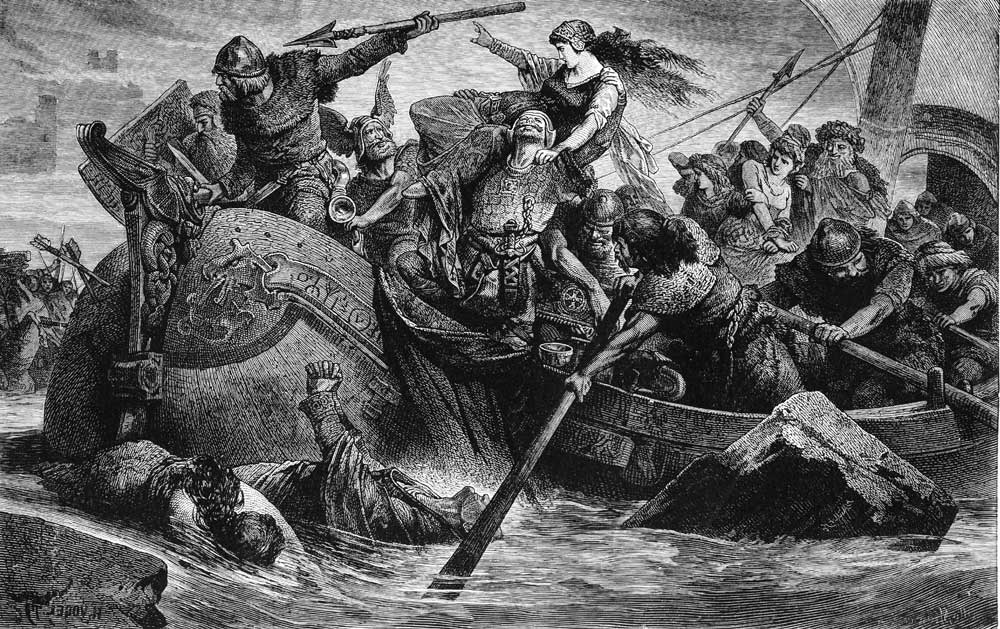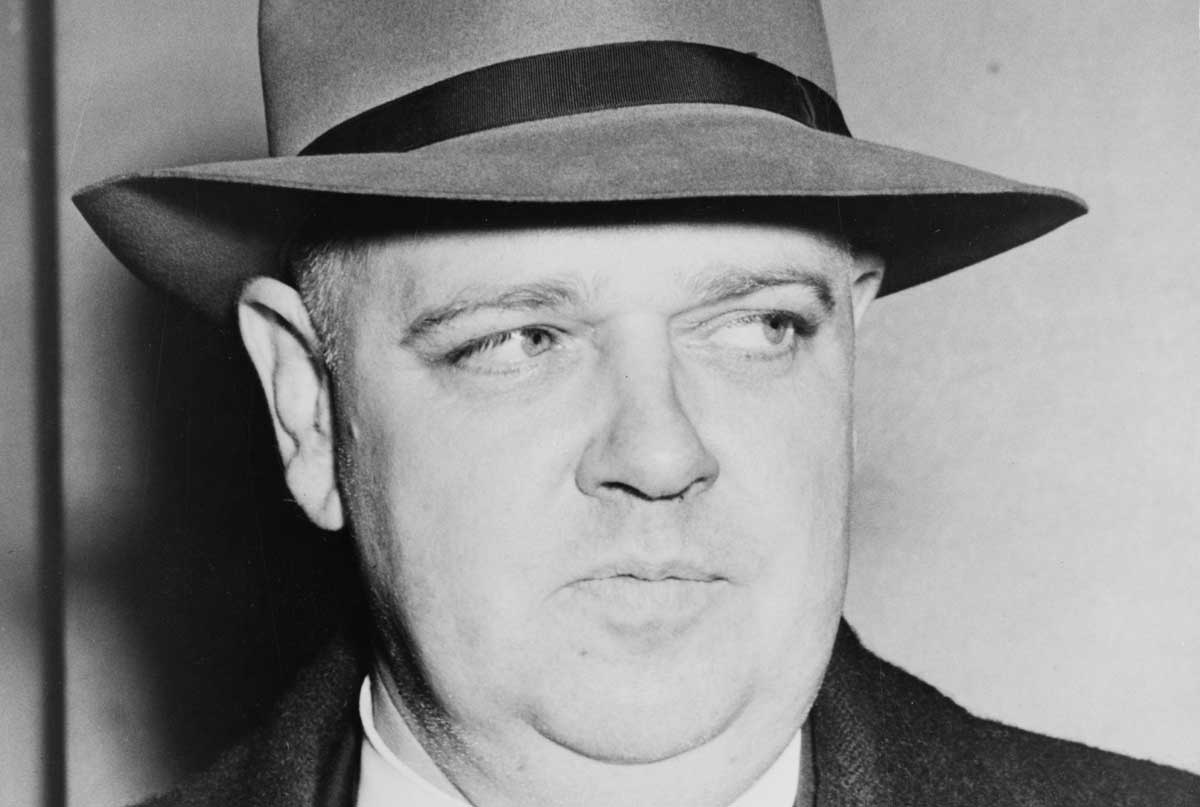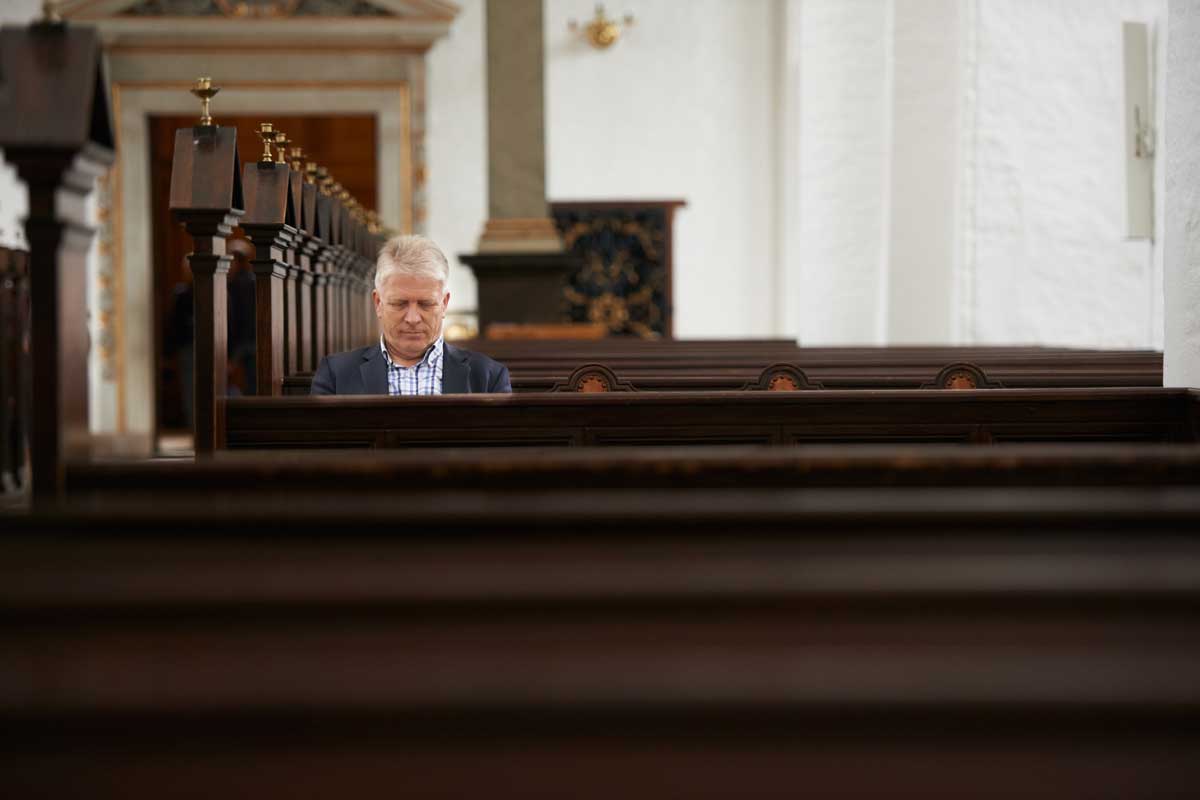View
Gone & Forgotten
Anthony Esolen on a Lost World &
Our Alien Nation
My wife has been hunting down old photographs of the villages where her English ancestors the Hortons and the Philhowers settled and cleared land for farming and built churches. In her search she's come upon a small time machine: Chester, New Jersey: A Scrapbook of History, eloquently written and annotated by an elderly native daughter in 1971. There were still a few people around then who had come of age before the mass phenomena of radio and television, and who could recall life in a genuine place, with a rich experience of time; one might say, time reckoned by timelessness. "Shake the hand that shook the hand of Lafayette!" said Chester's most colorful citizen, Nathan Cooper, many decades after Washington's friend visited Morris County and was regaled with the ringing of church bells, the firing of cannon, the cheering of crowds, and the singing of patriotic songs. It wasn't just that schoolchildren committed songs and poems and famous names and dates to memory. Everyone committed what they loved and honored to remembrance.
I wrote "time machine," but I might have written "spaceship," because whenever I open a magazine or a book of letters or sermons or orations from those times, I seem to know and not know the people they describe. They are human, they are beset with temptations, their views are often narrow, and much of their suffering they bring upon themselves; and yet they are strange to me. I read a matter-of-fact account of something that decent, rational, and God-fearing people would do, and it strikes me with dismay, because we have consigned everything in it to oblivion.
The Chester Institute
Let me give an example.
In 1854, one William Rankin came to town, invited by the leading citizen, Daniel Budd (Cooper's friendly rival) to establish a school called the Chester Institute. It accepted boarding students and day students; both boys and girls, taught separately. We can gather something of its character from a commencement speech by Charles Winfield, one of its first graduates. For one year, he says to the assembled students, parents, and citizens of the village, he had been "a pupil of your kind and worthy Preceptor." Returning to the school, says he, "I live over again those hours of youthful ambitions when Greek and Latin first claimed our attention," recollecting a time of walking and talking and even seeing in those languages. That instruction had practical advantages: "The little notes that in spite of watchfulness found their way to the young ladies in the room above, conveyed pretty sentiments wrapped up in stately Latin or beautiful Greek." He was one of the boarders, and was homesick at first, but on the very day of his arrival, Mr. Rankin became to him more than a teacher: "He was my friend."
Mr. Winfield's talk was printed out. The back of the broadside boasts an advertisement for the school, a part of which follows:
Its situation is noted for healthfulness, picturesqueness, and delightful Scenery. The Village of Chester, thinly scattered over a considerable extent of country, affords a safe retreat for the growth of intelligence and virtue in the youthful mind. It is sufficiently distant from railroads to avoid contact with the rubbish of immorality too apt to be drifted into country places by these thoroughfares. And parents will find more than a compensation for passing a few miles, per stage, over pleasant hill and dale with their children to reach this point of seclusion from temptation.
A lost world, as I say.

Education from Nature & in Morals
Do not suppose that the description of the place was mere puffery from Mr. Rankin. He believed ardently in the educational value of natural beauty. We see it in an excerpt from one of his public lectures. In the same year that the Chester Institute was founded, New Jersey passed a law establishing Teachers' Institutes, to ensure that teachers were adequately prepared for their work. Morris County held its first institute in Chester, at the Presbyterian Church; visitors were welcomed by the minister, Reverend Blauvelt, who was elected president. Chester's other two ministers were elected vice president and secretary.
Rankin was present, too, and, thinking less of the school building than of God's creation, advised the young teachers thus: "Let your pupils read Astronomy on the blue page of Heaven's vault; Botany on the spring bedecked hill and dale; Mineralogy in the gem-studded caverns on the rocky crest; Geology in the mountain's strata; Conchology on the ocean's strand." Those flights of enthusiasm give warrant to the testimony that this aficionado of dead languages, that same day, spoke to a hundred children, aged five to fifteen, who listened to him with rapt attention.
What about the advertisement's insistence upon moral upbringing? How sincerely was that meant? In 1869, after Chester had become a hub for the transport of iron mined nearby, the civic-minded Daniel Budd decided there were too many miners loitering near the school for the good of the young ladies. So he built a 26-room stone house on the outskirts of the village, away from the railroad station; the house boasted two concert rooms furnished with grand pianos. By this time Rankin had departed from Chester, and the school was run by Miss Susan Magie, reputed to be the best-read woman in New Jersey. The course of study she advertised in the Dover Mail in 1874 included the usual R's, along with Mental Arithmetic, Physiology, Botany, Philology, Rhetoric, French, German, Mental and Moral Philosophy, and Evidences of Christianity.
No surprise, that last item. "The education of our youth in the hands of such Christian men is safe," said one T. B. Stout, referring not to the Chester Institute in particular, but to the new public schools in Morris County. When Chester celebrated the centennial in 1876, special services were held in the churches; all the great civic events centered upon the churches. The Presbyterian Church was festooned with a hundred flags, hothouse flowers, red and white and blue bunting around the pillars, and portraits of George and Martha Washington. The Reverend Brewster, as reported in the Morris Republican, "delivered an interesting sermon, preceding it by a prayer rich in its reference to the perseverance of the fathers, and supplication for Divine Guidance in the future."
Recognized but Not Known
As I said, I recognize these people as human, but I do not know them.
I do not know what it is like to learn the classical languages at so young an age, from a man who has mastered them and their marvelous literature. I do not know, I cannot perceive around me, the innocence of boys and girls delighting in one another, the boys passing Greek or Latin love-tokens to the girls, while the instructors pretend to be vigilant. I never did the like. The upheaval of mores had already, when I was young, made such a thing quaint or incomprehensible, or a cover for a salacious proposal. I did know a couple of boys who took their girls to a local cemetery that commanded a distant view of the screen of an X-rated drive-in movie. Apparently it was not necessary to hear the words.
I cannot imagine boys and girls boarding on different stories of the same house, while keeping order. Four hundred students, most of them day students from the nearby families of farmers, merchants, artisans, and miners, were enrolled in the Chester Institute at its peak. There were no police (Chester did not have any policemen until the twentieth century), there were no teacher's aides, there was nothing under lock, there were no surveillance cameras, and there were only a few adults for all those children. I cannot see it.
I live in a time when Yale, a sybaritic pit for ignoramuses with brains and money, invites prostitutes to campus for show and tell. I think I can hear the rough jests of the iron miners as they troop from the railroad station to their work, though it is probably merrier than I suppose, and not scabrous. I know no one like Daniel Budd, who, hearing those jests, determined to relocate the school, at his own expense.
I do know high-school teachers who believe it is their sacred duty to expose young people to obscenity, if anything remains obscene, since many prominent personages in mass entertainment have no talent besides public sluttishness. I know no one like Arthur Rankin, a man of all trades, better educated than almost anyone teaching at universities today, devoting himself to the intellectual and moral development of children, characterizing as "rubbish" the immorality against which he would protect them, even while setting them free to roam the hills, learning natural science from nature herself. I live in a place whose children are encouraged to adore condoms as their saviors. I know not one child who can identify an oriole.
A Moral Constitution & Genuine Civic Culture
I do not know what it is like to gather with my townsmen for a civic holiday, celebrated at a church. That is, I do not know what it is like to see my nation in the light of God's salvific history, and to see God's commandments as a matter-of-course moral constitution for my nation. I have grown up in the wasteland of alienation of church from state, to the constriction of the former and the noxious metamorphosis and metastasis of the latter.
I cannot imagine the ease with which a private citizen could build a school, without an army of state extortionists and inspectors and accreditors demanding their take. Mr. Budd had met Mr. Rankin and selected him to be the headmaster of the school he wanted to build. I do not know how anyone could now make so quick and so clearly correct a selection, so bolstered and padded our graduates are with transcripts and testimonials that mean nothing, and so hindered we are, by law, from exercising the fundamental freedom of association.
I have never seen a hundred children of all ages listening in intense silence to a man speaking about school. I have seen teenage boys absorbed in video games, ignoring everyone around them. Naked men may grace the front page of my local newspaper, but never a sermon. I know what the phrase "one of the town's leading citizens" means, but not by experience. I cannot imagine a public teachers' institute electing three clergymen as its officers. I live in a time when the president chooses a sodomy-promoter to oversee "safety" and "diversity" in the schools. I do not know the people who would vote for the Reverend Blauvelt and his brethren. I know only a few clergymen who would be sufficiently learned and worthy for those people to support.
I do not know what it is like to live among people who, when they hear the word "culture," think of the classical languages, of great English poetry, of painting with oils and watercolors, of speaking German or French, of playing the piano or (for sacred music) the organ; of refinement of thought, and word, and manner. I live among people who equate culture with what blares from the television, or with a person's skin or genealogy. I do not know anyone like Nathan Cooper, who cultivated the land and the mind. I hardly know any farmers; I know no miners or railroad workers; I know very few people who are "cultured" in the sense that Arthur Rankin would recognize, and none of them works with his hands.
Bad People but Not Half-People
It strikes me that these people, our great-grandparents, would never have allowed their children, our grandparents, to associate with people like us. But that isn't quite right. They knew what sin and crime were. They had a whipping post until 1828. They knew bad people.
But they did not know half-people. They knew cads who fornicated in despite of the law of God and man. But they did not know the half-dead, who fornicate in a fog of listlessness or loneliness or indifference. They knew politicians who would take bribes. But they did not know people who had so lost not only the art but the very idea of self-government, that they should allow a vast machine of bureaucrats to monitor their every business transaction, their children's attendance at school, and their choices as to the care of their health; that they would allow nine lawyers in Washington to dictate what kind of ceremony they could hold at their own high-school graduation, or what monument they could erect on their own town common, or what restrictions they could place upon businesses and individuals to protect decency and public morals.
Give those people of old Chester antibiotics and antiseptics, and that's a fine life they would lead indeed. Would they reject us? Nothing so near to indignation as that. They would look upon us with blank incomprehension, as if we were creatures from a world that God had punished not by fire, but by forgetting. •
Anthony Esolen is Distinguished Professor of Humanities at Thales College and the author of over 30 books, including Real Music: A Guide to the Timeless Hymns of the Church (Tan, with a CD), Out of the Ashes: Rebuilding American Culture (Regnery), and The Hundredfold: Songs for the Lord (Ignatius). He has also translated Dante’s Divine Comedy (Random House) and, with his wife Debra, publishes the web magazine Word and Song (anthonyesolen.substack.com). He is a senior editor of Touchstone.
subscription options
Order
Print/Online Subscription

Get six issues (one year) of Touchstone PLUS full online access including pdf downloads for only $39.95. That's only $3.34 per month!
Order
Online Only
Subscription

Get a one-year full-access subscription to the Touchstone online archives for only $19.95. That's only $1.66 per month!
bulk subscriptions
Order Touchstone subscriptions in bulk and save $10 per sub! Each subscription includes 6 issues of Touchstone plus full online access to touchstonemag.com—including archives, videos, and pdf downloads of recent issues for only $29.95 each! Great for churches or study groups.
Transactions will be processed on a secure server.
more on history from the online archives
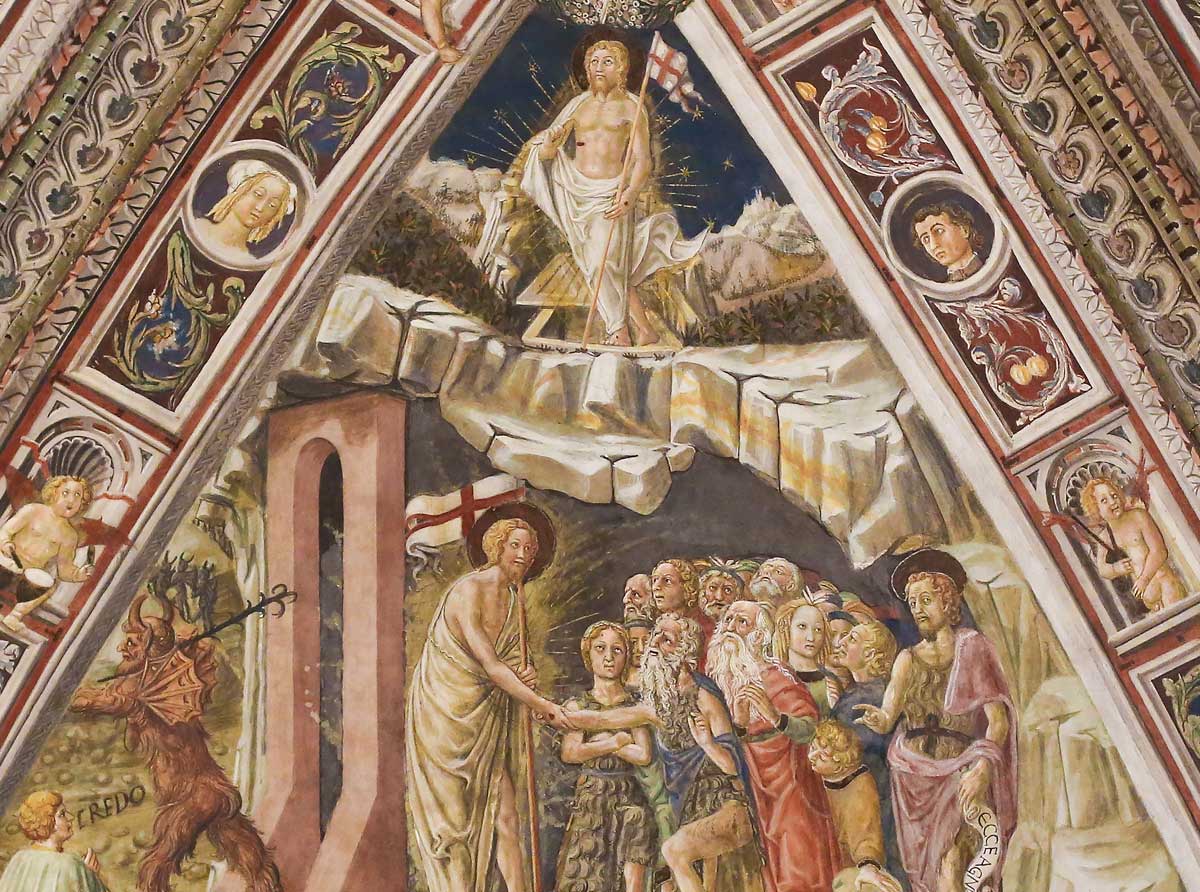
14.6—July/August 2001
The Transformed Relics of the Fall
on the Fulfillment of History in Christ by Patrick Henry Reardon
more from the online archives
calling all readers
Please Donate
"There are magazines worth reading but few worth saving . . . Touchstone is just such a magazine."
—Alice von Hildebrand
"Here we do not concede one square millimeter of territory to falsehood, folly, contemporary sentimentality, or fashion. We speak the truth, and let God be our judge. . . . Touchstone is the one committedly Christian conservative journal."
—Anthony Esolen, Touchstone senior editor





